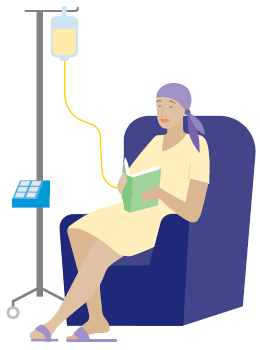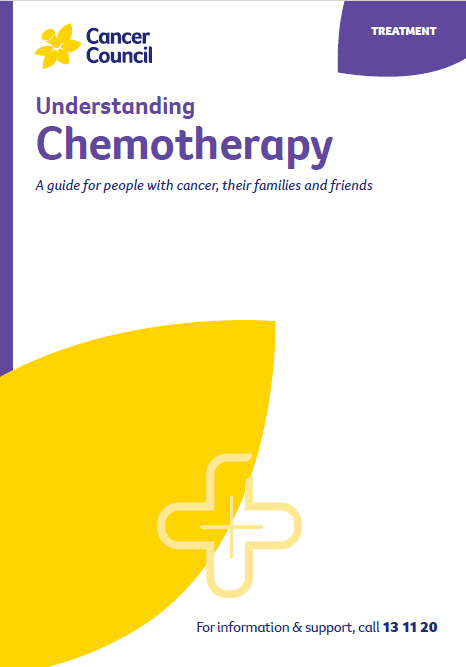- Home
- About Cancer
- Cancer treatment
- Chemotherapy
- Having chemotherapy
- Intravenous (IV) chemotherapy
Intravenous (IV) chemotherapy
Chemotherapy drugs are usually put straight into your blood as a liquid through a drip inserted into a vein (intravenous infusion).
Learn more about:
How is it given?

To prepare for IV chemotherapy, the treatment team will insert a narrow tube into a vein.
The drugs may be injected through a cannula or a type of central venous access device. The type of device used will depend on how often you need chemotherapy, how long it will take to give each dose and how long the device will need to stay in place.
Chemotherapy will usually be given during day visits to your hospital or treatment centre. In most cases, a single session takes between 20 minutes and several hours. This depends on what kind of treatment you are having.
For some types of cancer, a treatment session may take several days. This can be given with a portable pump that you can use at home to provide a continuous dose of chemotherapy (see below).
Infusion reactions
The infusion process may cause reactions (e.g. feeling hot or flushed, skin rashes, or difficulty breathing). While some drugs are more likely to cause a reaction in the first and second infusions, others may cause reactions later in the course. Your doctor can provide you with information.
A nurse will check for signs of a reaction and may give you medicines to help prevent them. Sometimes a reaction happens several hours after the infusion. If you develop any signs or feel unwell after you get home, contact the hospital straightaway.
→ READ MORE: How IV chemotherapy is delivered
Podcast: Making Treatment Decisions
Listen to more episodes from our podcast for people affected by cancer
More resources
A/Prof Kate Mahon, Director of Medical Oncology, Chris O’Brien Lifehouse, NSW; Katherine Bell, Dietetics Department, Liverpool Hospital, NSW; Brigitta Leben, Dietetics Department, Liverpool Hospital, NSW; Sophie Michele, 13 11 20 Consultant, Cancer Council SA; Dr Jess Smith, Medical Oncologist, Macquarie University Hospital, NSW; Karene Stewart, Consumer; Julie Teraci, Clinical Nurse Consultant, Skin Cancer and Melanoma, Cancer Network WA.
View the Cancer Council NSW editorial policy.
View all publications or call 13 11 20 for free printed copies.

